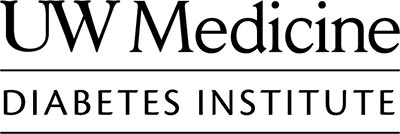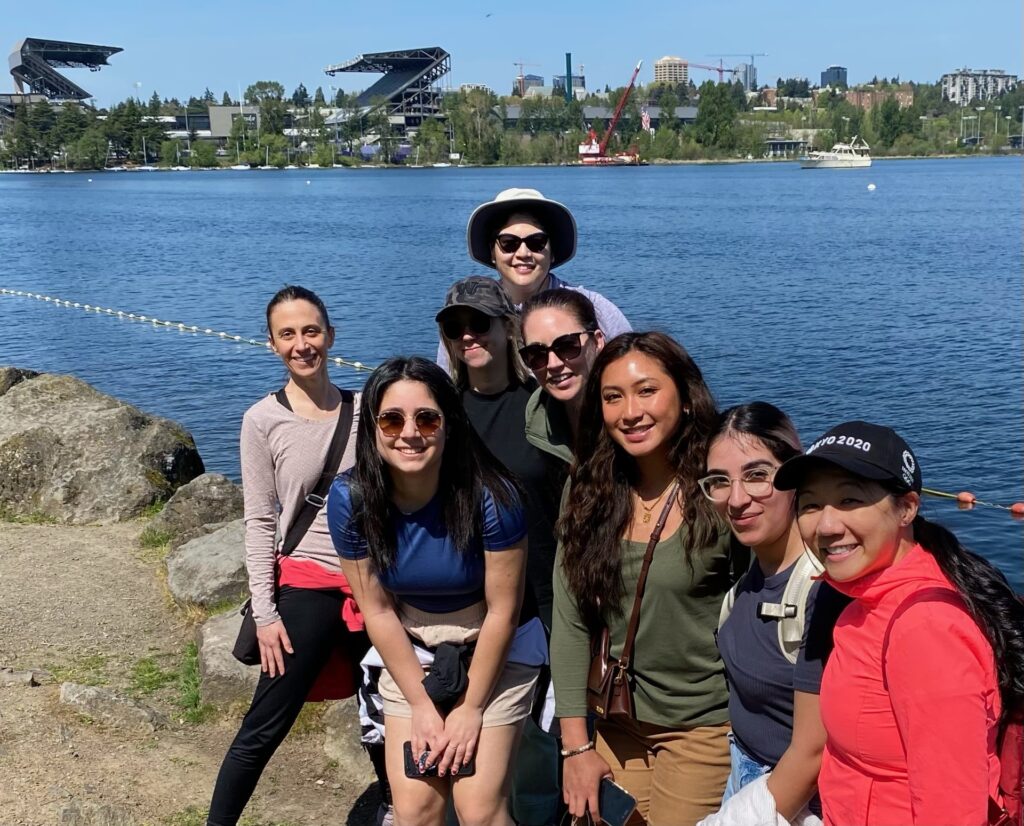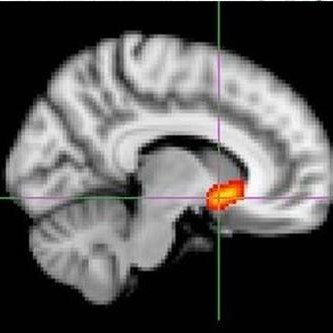Dedicated to understanding brain regulation of appetite and obesity pathogenesis in humans

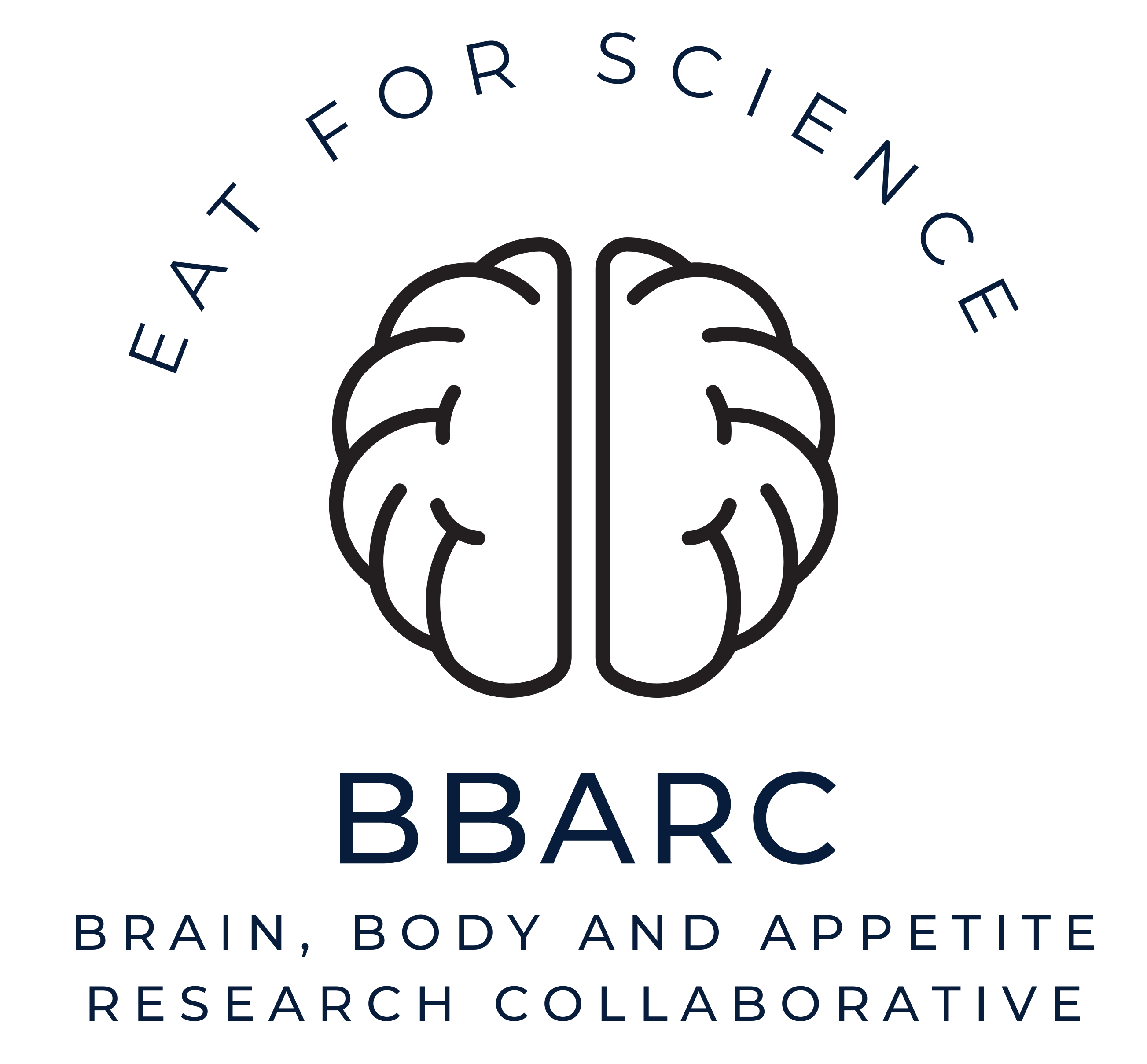 In BBARC studies, study participants often view images of food, such as those above, while undergoing an MRI scan to study the perception of appetite.
In BBARC studies, study participants often view images of food, such as those above, while undergoing an MRI scan to study the perception of appetite.
The Brain, Body and Appetite Research Collaborative (BBARC) is dedicated to improving the health and well-being of people living with obesity and related conditions through attaining a better understanding of the brain’s role in the development and treatment of these important health concerns. Appetite is regulated by the brain. This complicated regulation system uses some of the brain’s most powerful motivational signals to ensure we maintain sufficient energy stores for survival. These signals become even stronger when people try to lose weight, fighting back against the weight loss to rebuild energy stores in the form of fat. The function of this appetite-regulating system is influenced by genetic, environmental, behavioral, social, and physiologic factors. We therefore use multi-disciplinary research approaches that integrate fields including endocrinology, psychology, and neuroscience. Finally, we seek to be allies to people living with obesity; we strive to combat weight stigma in our personal interactions and by disseminating scientific knowledge regarding the biology of appetite and weight regulation.

Current Studies
Our functional MRI studies evaluate the influence of genetics, body weight, and weight loss on the brain’s response to images of high- and low-calorie food to reach a better understanding of how the brain shapes appetite. Our current structural MRI studies evaluate hypothalamic inflammation—or gliosis—in both adults and children. Gliosis, in its most serious manifestation, is a form of scarring. It results from highly energetic diets in rodents, and the BBARC lab is assessing whether this is also true in people. We are also actively investigating how hypothalamic gliosis might influence the risk of developing obesity or type 2 diabetes mellitus.
 The Weight Effects on Brain health Study (WEBS) seeks to understand the possible implications of hypothalamic inflammation on clinical weight management for humans undergoing obesity treatment
The Weight Effects on Brain health Study (WEBS) seeks to understand the possible implications of hypothalamic inflammation on clinical weight management for humans undergoing obesity treatment
![]()
 The Brain Effects on Appetite and Metabolism Study (BEAM) investigates if the presence of hypothalamic inflammation contributes to reduced satiety responsiveness and/or poor food intake regulation and if it is a risk factor of excessive weight gain. This is a 2-site study with participants at the University of Washington and Johns Hopkins University.
The Brain Effects on Appetite and Metabolism Study (BEAM) investigates if the presence of hypothalamic inflammation contributes to reduced satiety responsiveness and/or poor food intake regulation and if it is a risk factor of excessive weight gain. This is a 2-site study with participants at the University of Washington and Johns Hopkins University.
![]()
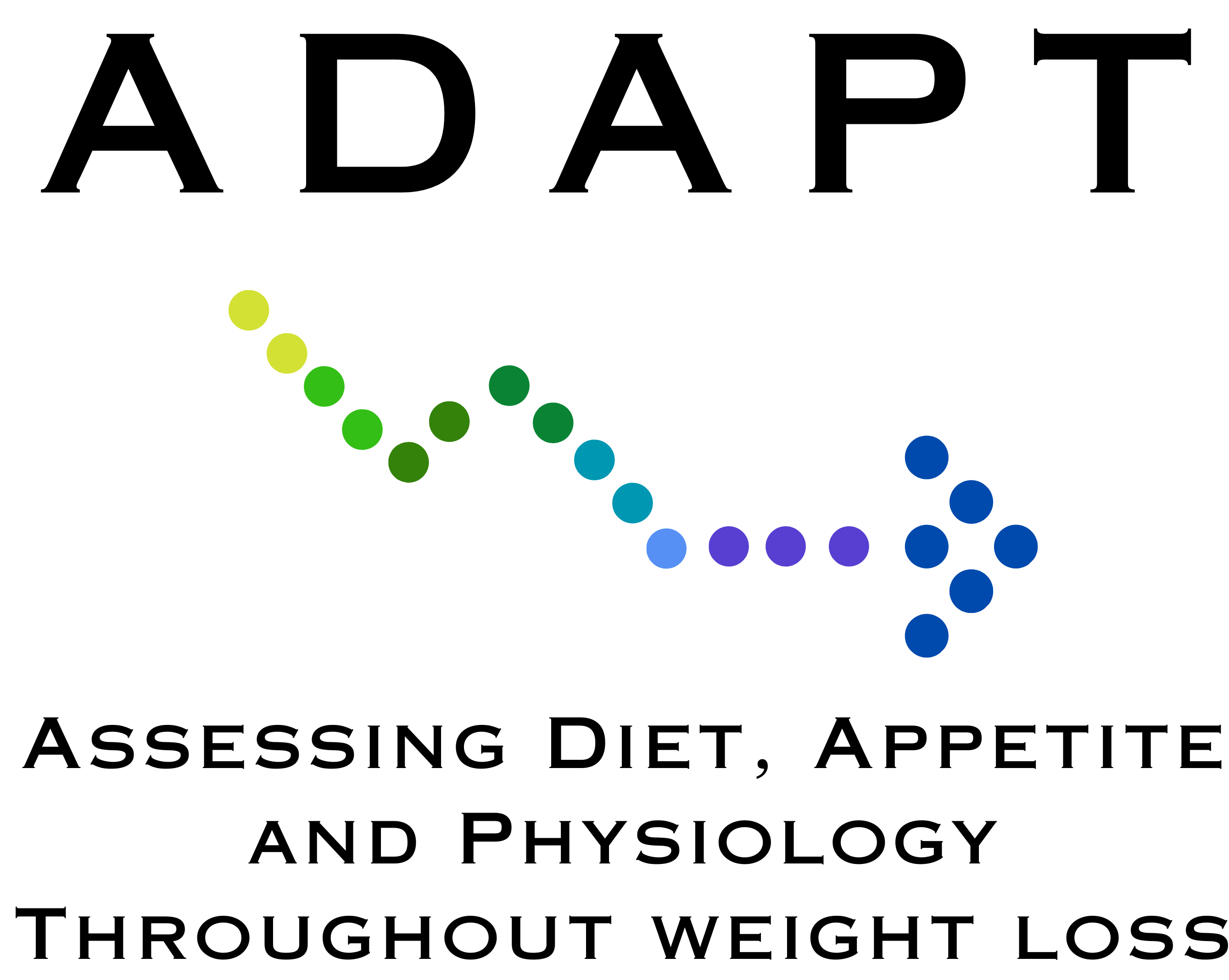
The Assessing Diet, Appetite and Physiology Throughout weight loss (ADAPT) study investigates if there are changes in metabolism and/or the brain that contribute to the occurrence of an involuntary weight loss plateau. This study is performed in collaboration with investigators at the Fred Hutch Cancer Center and the VA (VAPSHCS).
 The Brain Appetite and Satiety in Children-2 (BASIC2) study is performed in collaboration with Seattle Children’s and seeks to understand if the addition of a glucagon-like peptide-1 receptor agonist in combination with family-based behavioral treatment augments children’s weight loss through improved brain responses to a meal and/or reduced hypothalamic inflammation.
The Brain Appetite and Satiety in Children-2 (BASIC2) study is performed in collaboration with Seattle Children’s and seeks to understand if the addition of a glucagon-like peptide-1 receptor agonist in combination with family-based behavioral treatment augments children’s weight loss through improved brain responses to a meal and/or reduced hypothalamic inflammation.
![]()
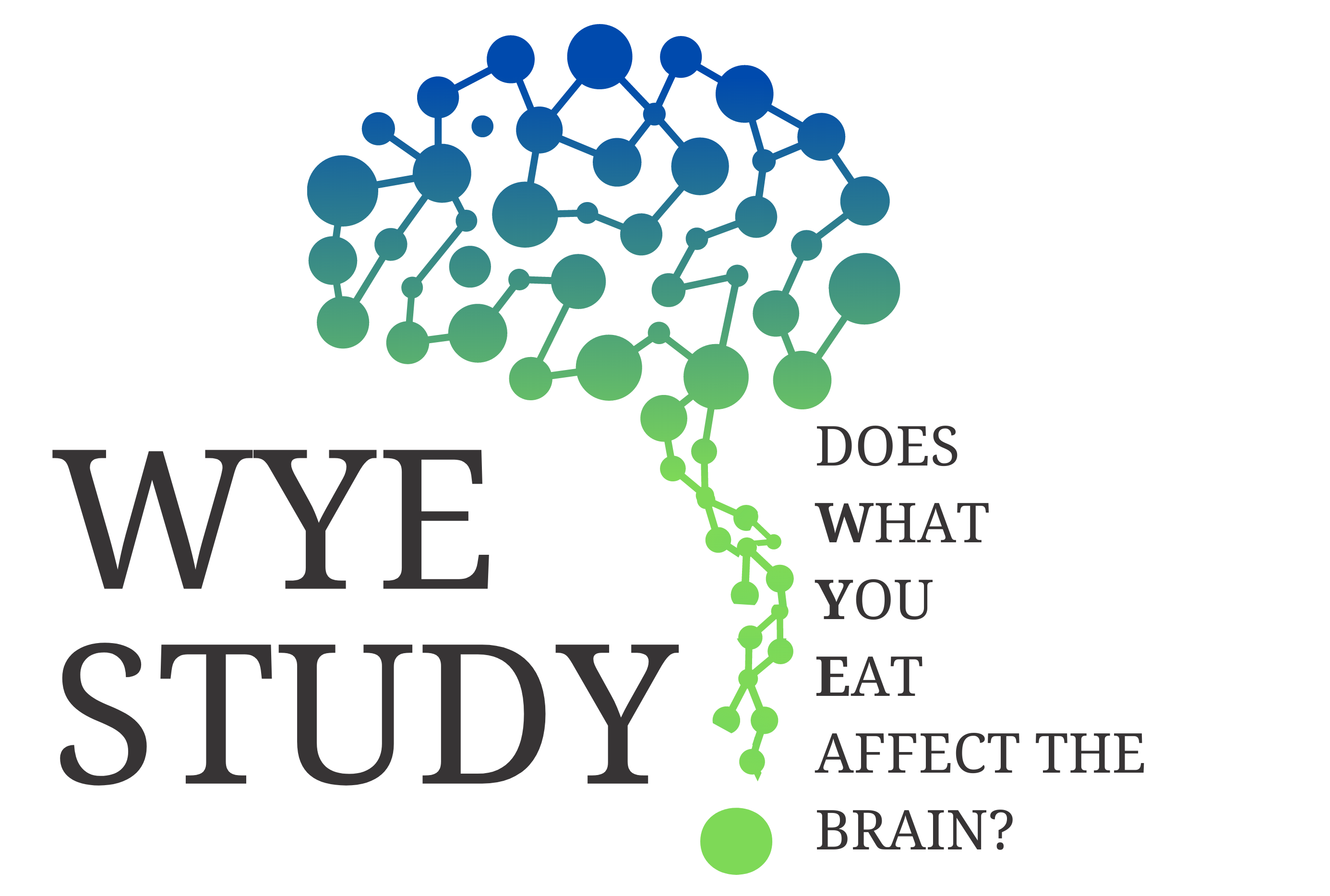 The does What You Eat affect your Brain (WYE) study seeks to understand the effect of diet in humans on hypothalamic inflammation
The does What You Eat affect your Brain (WYE) study seeks to understand the effect of diet in humans on hypothalamic inflammation
![]()
The implication of hypothalamic inflammation for cardiovascular disease study extends our current projects by investigating the relationship of hypothalamic inflammation and cardiovascular disease risk in humans in an ancillary study to the Framingham Heart Study.
Participate in our Studies!
-
If you would like to learn more about participation in one of our studies, please click on one of the links below.
We are actively recruiting for:
-
Brain Appetite and Satiety in Children-2 (BASIC2), children age 10-12
-
Does What you Eat affect your Brain (WYE), adults age 20-40
-
Brain, Body and Appetite Research Collaborative Featured Publications
The significance of hypothalamic inflammation and gliosis for the pathogenesis of obesity in humans. Leticia E Sewaybricker, Alyssa Huang, Suchitra Chandrasekaran, Susan J Melhorn, Ellen A Schur. Endocr Rev. 2022 Oct 17:bnac023. doi: 10.1210/endrev/bnac023. Epub ahead of print. PMID: 36251886.
Exposure to Gestational Diabetes Mellitus Prior to 26 Weeks is Related to The Presence of Mediobasal Hypothalamic Gliosis in Children. Chandrasekaran S, Melhorn S, Olerich KL, Angelo B, Chow T, Xiang A, Schur EA, Page KA. Diabetes. 2022 Sep 12:db220448. doi: 10.2337/db22-0448. Epub ahead of print. PMID: 36095276.
Impaired Brain Satiety Responses After Weight Loss in Children with Obesity. Roth CL, Melhorn SJ, De Leon MRB, Rowland MG, Elfers CT, Huang A, Saelens BE, Schur EA J Clin Endocrinol Metab. 2022 Jul 14;107(8):2254-2266. doi: 10.1210/clinem/dgac299. PMID: 35544121; PMCID: PMC9282278.
Evidence That Hypothalamic Gliosis Is Related to Impaired Glucose Homeostasis in Adults with Obesity. Rosenbaum JL, Melhorn SJ, Schoen S, Webb MF, De Leon MRB, Humphreys M, Utzschneider KM, Schur EA. Diabetes Care. 2022 Feb 1;45(2):416-424. doi: 10.2337/dc21-1535. PMID: 34848489; PMCID: PMC8914420.
Greater radiologic evidence of hypothalamic gliosis predicts adiposity gain in children at risk for obesity. Sewaybricker LE, Kee S, Melhorn SJ, Schur EA. Obesity (Silver Spring). 2021 Nov;29(11):1770-1779. doi: 10.1002/oby.23286. PMID: 34734493; PMCID: PMC8608399.
Initial evidence for hypothalamic gliosis in children with obesity by quantitative T2 MRI and implications for blood oxygen-level dependent response to glucose ingestion. Sewaybricker LE, Schur EA, Melhorn SJ, Campos BM, Askren MK, Nogueira GAS, Zambon MP, Antonio MARGM, Cendes F, Velloso LA, Guerra-Junior G. Pediatr Obes. 2019 Feb;14(2):e12486. doi: 10.1111/ijpo.12486. Epub 2018 Dec 10. PMID: 30537237; PMCID: PMC7027952.
Brain regulation of appetite in twins. Melhorn SJ, Mehta S, Kratz M, Tyagi V, Webb MF, Noonan CJ, Buchwald DS, Goldberg J, Maravilla KR, Grabowski TJ, Schur EA. Am J Clin Nutr. 2016 Feb;103(2):314-22. doi: 10.3945/ajcn.115.121095. Epub 2016 Jan 6. PMID: 26739033; PMCID: PMC4733261.
Radiologic evidence that hypothalamic gliosis is associated with obesity and insulin resistance in humans. Schur EA, Melhorn SJ, Oh SK, Lacy JM, Berkseth KE, Guyenet SJ, Sonnen JA, Tyagi V, De Leon MRB, Webb MF, Gonsalves ZT, Fligner CL, Schwartz MW, Maravilla KR. Obesity (Silver Spring). 2015 Nov;23(11):2142-8. doi: 10.1002/oby.21248. Erratum in: Obesity (Silver Spring). 2022 Jul;30(7):1520. PMID: 26530930; PMCID: PMC4634110.
Obesity is associated with hypothalamic injury in rodents and humans. Thaler JP, Yi CX, Schur EA, Guyenet SJ, Hwang BH, Dietrich MO, Zhao X, Sarruf DA, Izgur V, Maravilla KR, Nguyen HT, Fischer JD, Matsen ME, Wisse BE, Morton GJ, Horvath TL, Baskin DG, Tschöp MH, Schwartz MW. J Clin Invest. 2012 Jan;122(1):153-62. doi: 10.1172/JCI59660. Epub 2011 Dec 27. Erratum in: J Clin Invest. 2012 Feb 1;122(2):778. PMID: 22201683; PMCID: PMC3248304.
UW Department of Medicine’s Outstanding Staff Award: Ghada Abdalla & Susan Melhorn
The Outstanding Staff Award aims to recognize and celebrate exceptional staff members who are dedicated to supporting our organization’s mission of teaching, healing, discovery, and diversity and upholding core values.
Ghada Abdalla and Susan Melhorn of the UW NORC’s Clinical and Translational Research Services (CTRS) Core were both recognized and celebrated in the UW Department of Medicine’s Outstanding Staff Award.
Congratulations to the nominee of this award, Ghada Abdalla.
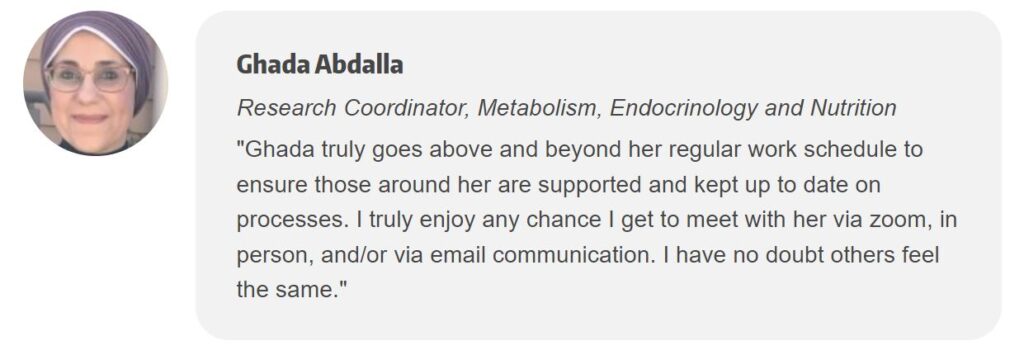
Congratulations to the inaugural recipient of this award, Susan Melhorn.
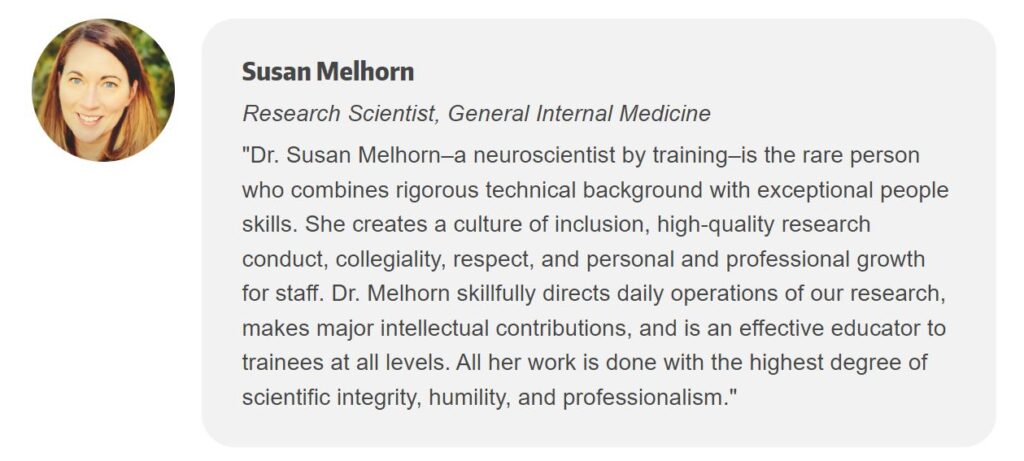
Members of the Brain, Body and Appetite Research Collaborative

Ellen Schur, MD, MS
Professor of Medicine
Director, UW Nutrition and Obesity Research Center (UW NORC)
Clinical Research Director, UW Medicine Diabetes Institute
Dr. Ellen Schur is the Principal Investigator of the Lab. She earned her medical degree from Stanford University, completed residency at UW in Internal Medicine and completed a master’s degree in Epidemiology from UW. Dr. Schur practiced primary care at Harborview Medical Center for 13 years. Her patient care is now focused on helping patients manage their weight and any associated health problems and is located at the UW Medicine Center for Weight Loss and Metabolic Surgery. Dr. Schur has led interdisciplinary studies funded by the National Institutes of Health and American Diabetes Association, among others. Dr. Schur discovered the first evidence of inflammation and potential scarring in body-weight regulating areas of the brain in humans. She is dedicated to mentoring and was the founding Chair of the Department of Medicine’s Mentorship committee.

Susan Melhorn, PhD
Senior Research Scientist
Research Manager, BBARC
Dr. Susan Melhorn earned her PhD in neuroscience at the University of Cincinnati and completed a post-doctoral fellowship at UW. Her graduate and post-graduate training utilized animal models to study ingestive behavior, obesity, and chronic social and physiological stress. Susan joined the team in 2011 and is the BBARC’s Senior Research Scientist. Susan is the project manager and primary data and neuroimaging analyst for the projects under Dr. Schur. She is part of the UW Nutrition and Obesity Research Center’s Clinical and Translational Research Services core providing coordination of MRI acquisitions and MRI analyses for UW NORC affiliate investigators.

Leticia Sewaybricker, MD, PhD
Acting Instructor
Dr. Leticia Sewaybricker earned her medical degree, completed residency in Pediatrics and fellowship in Pediatric Endocrinology at the University of Campinas, Brazil. She first joined the BBARC team in 2015 to conduct part of her PhD research. After completing her PhD at the University of Campinas, Leticia returned to the team in 2018 as a postdoctoral scholar to continue work related to brain structural and functional characteristics, appetite and body weight regulation in children. She was recently granted an AHA career development award to study the impact of social and environmental factors in the brain and future cardiometabolic risk in children.

Alyssa Huang, MD
Assistant Professor of Pediatrics
Dr. Alyssa Huang completed a dual major in neuroscience and psychology at Northwestern University, her medical degree at The Ohio State University College of Medicine and her Pediatric Residency at Los Angeles County – University of Southern California Medical Center. She subsequently completed her pediatric endocrinology fellowship at the University of California San Francisco where she investigated how macronutrients affect the brain and feeding behavior in mouse models. In 2019, she joined University of Washington and Seattle Children’s Hospital Division of Endocrinology. She is the co-medical director for the pediatric Insulin Resistance and Type 2 Diabetes Clinics and provides care in the Adolescent and Young Adult Diabetes Clinic. Dr. Huang joined the BBARC in 2021 to pursue her research interests in understanding the complex relationship between the brain, feeding behavior and development of obesity and diabetes in children and adolescents. She was awarded the Diabetes Research Center Pilot and Feasibility award in 2021 to study hypothalamic changes in youth with type 1 diabetes. She recently was accepted to the Seattle Children’s Clinical Research Scholar Program to complete a pilot study aimed at assessing the association between hypothalamic changes in youth with obesity, prediabetes and type 2 diabetes.

Melbin Thomas, MD
Endocrinology Fellow
Melbin Thomas is currently a second-year endocrinology research fellow at the University of Washington. Her interest in research began after she graduated medical school. She worked as a clinical research coordinator for a few years prior to starting her Internal Medicine residency at Sinai Hospital of Baltimore. During her residency, she enjoyed the vast diversity of topics seen in endocrinology. To pursue her interest in endocrinology, she moved across the coast to begin her fellowship. Her research interest is in the field of obesity and nutrition. She is currently working on the WYE project in Dr. Schur's lab.

Dabin Yeum, PhD
Post Doc
Dr. Dabin Yeum earned her PhD in Quantitative Biomedical Sciences program at Dartmouth College. Her graduate research involved investigating various aspects of childhood obesity including the genetic risk score, neural reward reactivity and attentional bias to food cues, and eating behaviors. Dabin joined the team in 2023 as a postdoctoral scholar.

Mary Webb
Research Coordinator
Mary is BBARC's IRB specialist, obtaining approvals and managing compliance and maintenance needs. She leads recruitment efforts for WEBS and WYE and manages study visit scheduling across multiple studies.

Roz De Leon
Research Coordinator
Roz is the primary coordinator responsible for executing study visits, recruitment and retention and is currently actively working on our BASIC2 and WEBS projects.

Miriam Rodriguez Ruiz

Olivia Carter
Research Study Assistant
Olivia completed her undergraduate degree in Biology from the University of Nevada, Reno in 2022 and joined BBARC in 2023. She is actively working on WEBS and BASIC2 in executing study visits and supporting study activities.
Lab Alumni

Suchi Chandrasekaran, MD, MSCE
Assistant Professor of Medicine
Emory University
Dr. Suchitra Chandrasekaran earned her medical degree from Northwestern University, completed residency in Obstetrics and Gynecology at The Ohio State University and fellowship in Maternal Fetal Medicine at the University of Pennsylvania. Dr. Chandrasekaran worked with the BBARC team while she was a Women’s Reproductive Health Research fellow and was awarded a UW Diabetes Research Center Pilot and Feasibility Award. She is now at Emory University running an independent research program studying relationships among hypothalamic inflammation, gestational weight gain, and gestational metabolic disease.

Jennifer Rosenbaum, MD, MEd
Endocrinologist
Kaiser Permanente Northwest
Dr. Jennifer Rosenbaum earned her medical degree from the University of California-San Francisco, completed residency at Providence Portland Medical Center in Internal Medicine and an Endocrinology Fellowship at UW. Jennifer worked with the BBARC team during her endocrinology fellowship investigating brain inflammation and glucose regulation. She has since gone on to complete an informatics fellowship at Oregon Health Sciences University earing a masters in bioinformatics. Dr. Rosenbaum is currently a practicing endocrinologist at Northwest Permanente (Kaiser) in Portland and working as a physician champion (informatics).

Kelsey Olerich, MD, PhD
Maternal Fetal Medicine Specialist
Swedish Hospital/Providence Medical Group
Dr. Kelsey Olerich earned her medical degree and doctorate from the University of Iowa, completed residency in Obstetrics and Gynecology at Washington University in St. Louis, and fellowship in Maternal Fetal Medicine at the University of Washington. Kelsey worked with the BBARC team while completing her fellowship and investigated the impact of maternal metabolic disease on radiologic evidence of offspring hypothalamic gliosis. Dr. Olerich is currently a Maternal Fetal Medicine Specialist at Providence/Swedish Hospital in Washington.

Caila Tongco

Sara Pirouz

Sarah Kee
Contact Us
UW Medicine Diabetes Institute
750 Republican Street, Box 358062
Seattle, WA 98109
Ellen Schur: (206) 543-8433
Susan Melhorn: (206) 616-3984
Ellen Schur: ellschur@uw.edu
Susan Melhorn: smelhorn@uw.edu
To inquire about Postdoctoral and Graduate Student Openings click on: ellschur@uw.edu
